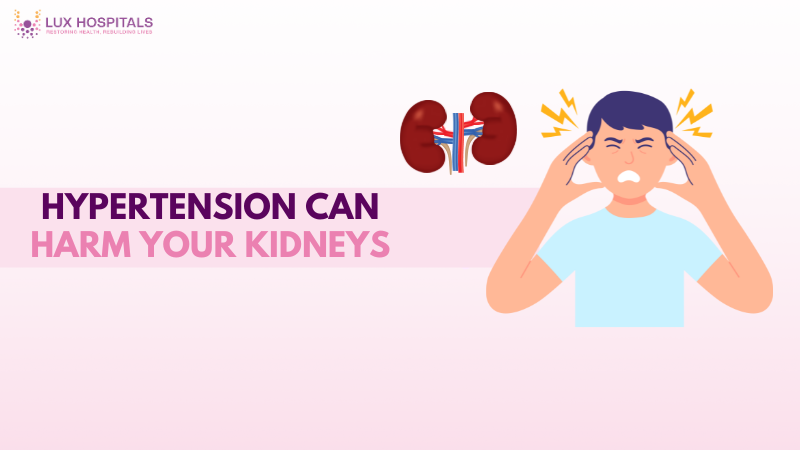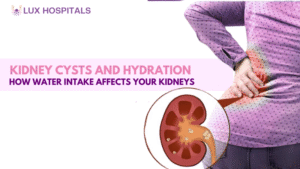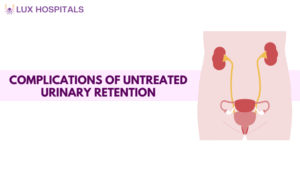Is Your High Blood Pressure Damaging Your Kidneys?

High blood pressure doesn’t just strain your heart—it can slowly and silently harm your kidneys too. Many people don’t realize that high blood pressure is a leading cause of kidney disease. Over time, uncontrolled blood pressure can damage the kidneys’ fragile blood veins, preventing them from performing as intended. This blog explores how high blood pressure affects the kidneys, how to spot warning signals, and health maintenance techniques. Irreversible kidney damage and the ultimate requirement for dialysis or a kidney transplant can be prevented with early management.
How High Blood Pressure Affects Kidney Function?
The tiny filtering units in your kidneys, called nephrons, are constantly strained by high blood pressure. The kidneys may find it more difficult to eliminate waste and maintain fluid balance as a result of the weakening and scarring caused by this continuous pressure. This eventually results in chronic renal disease, and if left untreated, kidney failure.
Signs Your Kidneys May Be Affected
The early symptoms of high blood pressure affecting your kidneys can be subtle. Typical signs and symptoms include:
- Swelling in the hands, feet, or ankles
- Fatigue and weakness
- Changes in urination (frequency or colour)
- Shortness of breath
- Persistent nausea or a metallic taste
These symptoms may not appear until kidney function is significantly impaired.
Why You Shouldn’t Ignore High Blood Pressure?
Many people live with high blood pressure for years without knowing it. Unfortunately, this silent condition can slowly destroy kidney function without clear warning signs. The damage is often irreversible, making prevention and regular monitoring essential for long-term health.
Who Is Most at Risk of Kidney Damage?
You may be at higher risk of kidney complications from high blood pressure if you:
- Have diabetes
- Are over age 60
- Have a family history of kidney disease
- Are you African American or Hispanic
- Smoke or consume high-sodium diets
These factors amplify the impact of high blood pressure on kidney health.
Diagnosing Kidney Damage from High Blood Pressure?
Physicians use standard laboratory tests to identify kidney disease, including :
- Blood tests for creatinine and eGFR
- Urine tests for protein (a sign of kidney leak)
- Imaging tests like ultrasounds
- Kidney biopsy in some advanced cases
Early detection of kidney damage related to high blood pressure can prevent further progression.
How to Protect Your Kidneys from High Blood Pressure?
Further advancement of kidney disease linked to high blood pressure can be avoided with early identification
- Monitor your blood pressure regularly
- Reduce salt intake
- Maintain a healthy weight
- Exercise regularly
- Take medications as prescribed
Lifestyle changes, when combined with medical treatment, can stop or reduce the rate at which kidney damage occurs.
Medications That Help Both Blood Pressure and Kidney Health
Doctors often prescribe ACE inhibitors or ARBs to patients with high blood pressure and kidney issues. These medications not only lower blood pressure but also protect the kidneys from further damage. Adhering to the prescribed treatment plan is crucial for maintaining long-term health.
The Link Between High Blood Pressure and Kidney Failure
Kidney failure brought on by uncontrolled high blood pressure may eventually necessitate dialysis or a kidney transplant. End-stage renal disease (ESRD) is the term used to describe this stage. Since kidney damage at this stage is typically irreversible and life-altering, early management of high blood pressure is crucial. And life-altering, making early control of high blood pressure essential.
Lifestyle Changes That Support Both Heart and Kidney Health
Take into account the following to lessen the effects of high blood pressure on your kidneys :
- Eat more fruits and vegetables
Reduce consumption of salt and processed foods.
- Drink plenty of water
- Quit smoking
- Limit alcohol and caffeine intake
These changes can significantly reduce the burden on both your heart and kidneys.
Monitoring and Regular Checkups
If you have high blood pressure, your regular care should include kidney screenings. At least once a year, request blood and urine testing from your physician. It is possible to identify and treat renal stress early on before serious harm is done.
Conclusion
High blood pressure may seem manageable, but its hidden effects can be devastating, especially when it comes to your kidneys. You can prevent permanent kidney damage and maintain better overall health by controlling your high blood pressure. Being proactive is the most effective approach to protecting your kidneys, whether that means taking medication, modifying your lifestyle, or undergoing regular checkups. Take control of your blood pressure now rather than waiting for symptoms to appear.
Frequently Asked Questions
Yes, long-term hypertension can harm your kidneys' tiny blood vessels. As a result, they are less able to regulate fluid levels and filter waste. If treatment is not received, it may lead to chronic renal disease and ultimately kidney failure.
You may not notice symptoms until the damage is advanced. Early warning signs include swelling, fatigue, and changes in urination. Lab tests are the most reliable method for detecting kidney problems caused by high blood pressure.
Foods low in sodium and rich in potassium can help. Focus on fruits, vegetables, whole grains, and lean proteins. Reducing processed foods and increasing water intake supports both blood pressure control and kidney health.
In the early stages, kidney damage from high blood pressure may be slowed or partially reversed with treatment. However, advanced damage is often permanent. That's why early detection and control are critical.
Doctors recommend kidney function tests at least once a year for individuals with high blood pressure. Those with additional risk factors may require more frequent monitoring. To evaluate kidney function, these tests include blood work and urine analysis. .




















